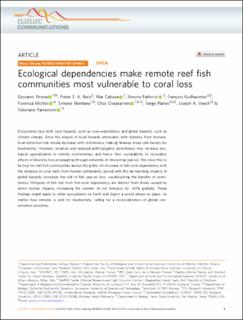Ecological dependencies make remote reef fish communities most vulnerable to coral loss
| dc.contributor.author | Strona, Giovanni | |
| dc.contributor.author | Beck, Pieter S. A. | |
| dc.contributor.author | Cabeza, Mar | |
| dc.contributor.author | Fattorini, Simone | |
| dc.contributor.author | Guilhaumon, François | |
| dc.contributor.author | Micheli, Fiorenza | |
| dc.contributor.author | Montano, Simone | |
| dc.contributor.author | Ovaskainen, Otso | |
| dc.contributor.author | Planes, Serge | |
| dc.contributor.author | Veech, Joseph A. | |
| dc.contributor.author | Parravicini, Valeriano | |
| dc.date.accessioned | 2023-02-23T13:57:09Z | |
| dc.date.available | 2023-02-23T13:57:09Z | |
| dc.date.created | 2022-01-05T12:39:44Z | |
| dc.date.issued | 2021 | |
| dc.identifier.issn | 2041-1723 | |
| dc.identifier.uri | https://hdl.handle.net/11250/3053671 | |
| dc.description.abstract | Ecosystems face both local hazards, such as over-exploitation, and global hazards, such as climate change. Since the impact of local hazards attenuates with distance from humans, local extinction risk should decrease with remoteness, making faraway areas safe havens for biodiversity. However, isolation and reduced anthropogenic disturbance may increase ecological specialization in remote communities, and hence their vulnerability to secondary effects of diversity loss propagating through networks of interacting species. We show this to be true for reef fish communities across the globe. An increase in fish-coral dependency with the distance of coral reefs from human settlements, paired with the far-reaching impacts of global hazards, increases the risk of fish species loss, counteracting the benefits of remoteness. Hotspots of fish risk from fish-coral dependency are distinct from those caused by direct human impacts, increasing the number of risk hotspots by ~30% globally. These findings might apply to other ecosystems on Earth and depict a world where no place, no matter how remote, is safe for biodiversity, calling for a reconsideration of global conservation priorities. | en_US |
| dc.language.iso | eng | en_US |
| dc.publisher | Nature | en_US |
| dc.rights | Navngivelse 4.0 Internasjonal | * |
| dc.rights.uri | http://creativecommons.org/licenses/by/4.0/deed.no | * |
| dc.title | Ecological dependencies make remote reef fish communities most vulnerable to coral loss | en_US |
| dc.title.alternative | Ecological dependencies make remote reef fish communities most vulnerable to coral loss | en_US |
| dc.type | Peer reviewed | en_US |
| dc.type | Journal article | en_US |
| dc.description.version | publishedVersion | en_US |
| dc.source.volume | 12 | en_US |
| dc.source.journal | Nature Communications | en_US |
| dc.identifier.doi | 10.1038/s41467-021-27440-z | |
| dc.identifier.cristin | 1975082 | |
| cristin.ispublished | true | |
| cristin.fulltext | original | |
| cristin.qualitycode | 2 |
Tilhørende fil(er)
Denne innførselen finnes i følgende samling(er)
-
Institutt for biologi [2575]
-
Publikasjoner fra CRIStin - NTNU [38127]

